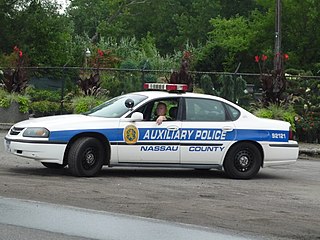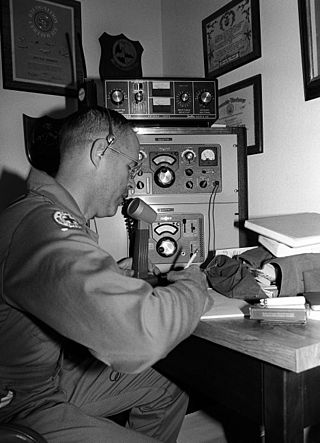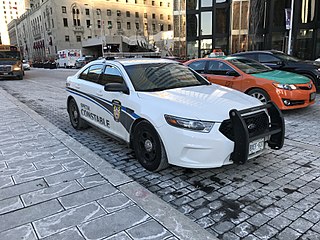
The Chicago Police Department (CPD) is the primary law enforcement agency of the city of Chicago, Illinois, United States, under the jurisdiction of the Chicago City Council. It is the second-largest municipal police department in the United States, behind the New York City Police Department. As of 2022 CPD had 11,710 sworn officers on duty, and in 2020 had over 948 other employees. Tracing its roots to 1835, the Chicago Police Department is one of the oldest modern police departments in the world.
Special police usually describes a police force or unit within a such an agency whose duties and responsibilities are significantly different from other forces in the same country or from other personnel within the same agency, although there is no consistent international definition. Generally, special police personnel hold some level of police powers; sometimes they hold the same powers and authority of other law enforcement officers within their jurisdiction, but at a minimum they will typically possess detainment and arrest authority. 'Special police' is also occasionally used when referring to an 'elite' law enforcement agency or unit, such as special weapons and tactics (SWAT) units or other similar paramilitary forces whom posses some level of police power. 'Special police' may also be used to describe individuals who are granted police powers incidental to their primary duties, such as welfare fraud investigators, certain security guards, child welfare investigators, and agricultural inspectors. Special police personnel may be armed or unarmed.
In law enforcement in the United States, a gypsy cop, also known as a wandering police officer, is a police officer who frequently transfers between police departments, having a record of misconduct or unsuitable job performance. The term is slang, referencing the stereotypical nomadic lifestyle of Gypsies.

Auxiliary police, also called volunteer police, reserve police, assistant police, civil guards, or special police, are usually the part-time reserves of a regular police force. They may be unpaid volunteers or paid members of the police service with which they are affiliated; There is no consistent international definition.

Auxiliaries are support personnel that assist the military or police but are organised differently from regular forces. Auxiliary may be military volunteers undertaking support functions or performing certain duties such as garrison troops, usually on a part-time basis. Unlike a military reserve force, an auxiliary force does not necessarily have the same degree of training or ranking structure as regular soldiers, and it may or may not be integrated into a fighting force. Some auxiliaries, however, are militias composed of former active duty military personnel and actually have better training and combat experience than their regular counterparts.

The New York City Police Department Auxiliary Police is a volunteer reserve police force which is a subdivision of the Patrol Services Bureau of the New York City Police Department. Auxiliary Police Officers assist the NYPD with uniformed patrols, providing traffic control, crowd control, and other services during major events.
Police misconduct is inappropriate conduct and illegal actions taken by police officers in connection with their official duties. Types of misconduct include among others: sexual offences, coerced false confession, intimidation, false arrest, false imprisonment, falsification of evidence, spoliation of evidence, police perjury, witness tampering, police brutality, police corruption, racial profiling, unwarranted surveillance, unwarranted searches, and unwarranted seizure of property.

The Florida Highway Patrol (FHP) is a division of the Florida Department of Highway Safety and Motor Vehicles. It is Florida's highway patrol and is the primary law enforcement agency charged with investigating traffic crashes and criminal laws on the state's highways.

As of 2020, more than 900,000 sworn law enforcement officers have been serving in the United States. About 137,000 of those officers work for federal law enforcement agencies.

The Colorado Rangers Law Enforcement Shared Reserve (CLER), known publicly as the Colorado Rangers, is a statewide police agency in the U.S. state of Colorado. It is a statewide law enforcement reserve of sworn POST-certified peace officers who serve as force multipliers, allowing Colorado law enforcement agencies to reduce costs and manpower through a shared force. It is the only such statewide police reserve force in the United States. The Colorado Rangers have existed in some capacity since Colorado Territory's formation in 1861, though the modern agency was formed in 2017 from the Colorado Mounted Rangers.
Company police, also called private police, are privately paid law enforcement officers who work for private security companies or private military companies rather than a municipal, county, state, or national agency.

The Ohio State Highway Patrol is a division of the Ohio Department of Public Safety and has the primary responsibility of traffic enforcement in the U.S. state of Ohio.

Colorado Mounted Rangers (CMR) is a 501(c)(3) nonprofit organization and former statutory state law enforcement auxiliary in the US State of Colorado. The organization served as the legal entity for the Colorado Rangers from February 1941 until In July 2018, when the Colorado Mounted Rangers ceased their operational law enforcement activities, transitioning the Colorado Rangers to a newly formed government agency named Colorado Rangers Law Enforcement Shared Reserve.

A special constable or special police constable can refer to an auxiliary or part-time law enforcement officer or a person who is granted certain (special) police powers.
In South Carolina, a State Constable is a law enforcement officer who is either a uniformed or plainclothes law enforcement officer employed by one of the departments of the state government, a retired police officer, or a volunteer reserve police officer. Officers may be variously described as "State Constable", "Special State Constable", "Department of Public Safety (DPS) Special Constable" and "Magistrates' Constable". State Constables are appointed by the Governor of South Carolina, and regulated by the South Carolina Law Enforcement Division.
In the United States, certification and licensure requirements for law enforcement officers vary significantly from state to state. Policing in the United States is highly fragmented, and there are no national minimum standards for licensing police officers in the U.S. Researchers say police are given far more training on use of firearms than on de-escalating provocative situations. On average, US officers spend around 21 weeks training before they are qualified to go on patrol, which is far less than in most other developed countries.

Police reform in the United States is an ongoing political movement that seeks to reform systems of law enforcement throughout the United States. Many goals of the police reform movement center on police accountability. Specific goals may include: lowering the criminal intent standard, limiting or abolishing qualified immunity for law enforcement officers, sensitivity training, conflict prevention and mediation training, updating legal frameworks, and granting administrative subpoena power to the U.S. Department of Justice for "pattern or practice" investigations into police misconduct and police brutality.

On September 1, 2015, American police lieutenant Charles Joseph "Joe" Gliniewicz was found dead in a wooded area in Fox Lake, Illinois. The incident gained national coverage as it was initially believed that Gliniewicz was murdered by three unknown assailants. However, after two months of investigation, officials of the Lake County Major Crime Task Force concluded that Gliniewicz had actually committed suicide that he staged to look like murder, after realizing that his many years of criminal activity would soon be exposed.

The Cocoa Police Department (CPD) is the primary law enforcement agency for the city of Cocoa, Florida, and is accredited through the state of Florida. The department services approximately 19,000 residents within 15.41 sq miles of the municipality. The department also serves roughly 2,500 daily non-residents who commute to the municipality for employment.
The Florida Criminal Justice Standards & Training Commission(CJSTC), established in 1967 under Florida Statutes, Chapter 943, is a Florida state commission. The Commission's mission is "To ensure that all citizens of Florida are served by criminal justice officers who are ethical, qualified, and well-trained." It is part of the Florida Department of Law Enforcement.













